Champions League final? The Vatican had its own championship soccer game
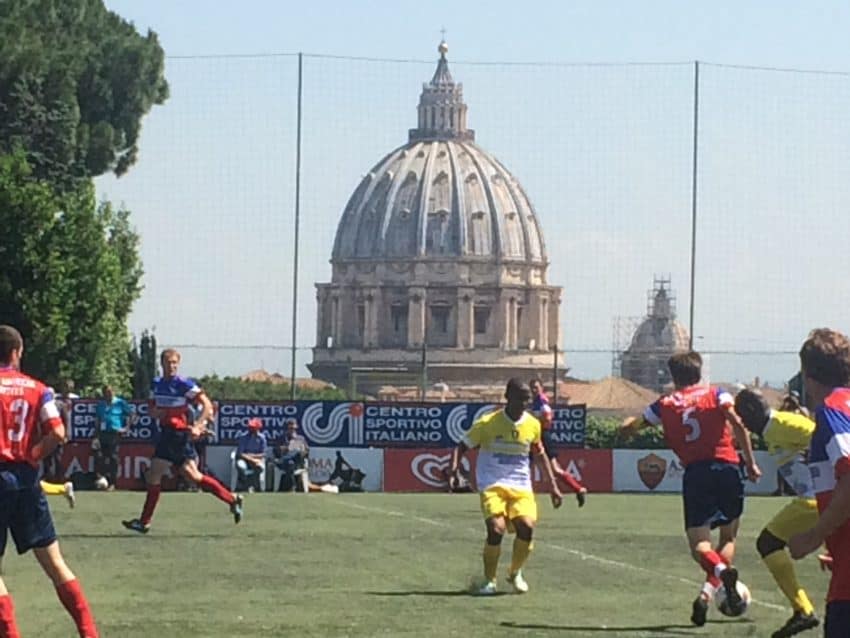
Every seminary student in Rome studying to be a priest sets himself on a personal mission. He is dedicating his life to carrying God’s message, to bring joy to people, to build fraternity among his fellow man.
Saturday afternoon the mission for Stephen Cieslak, ordained as a deacon just a week ago, is to stop a penalty kick from Robert Kayiwa, a seminary student from Uganda. There will be more important times in these two men’s lives, but without a Bible in hand and clerical collar around their necks, no moment may be bigger than right then.
The two were engaged in a penalty shootout in the championship game of the Clericus Cup, a Vatican soccer tournament involving 16 teams made up entirely of seminary students and priests. Organized by the Centro Sportivo Italiano, it started 12 years ago when Cardinal Tarcisio Bertoni, then the Cardinal Secretary of State, wanted soccer to teach the “language of the world,” billing it “Prayer and Player.”

Saturday was the morning of the Champions League final. About 1,500 miles to the north in Kiev, Ukraine, Real Madrid and Liverpool would play before a worldwide TV audience and two fan bases that don’t take a back seat to any in the world. Going from one extreme to another Saturday, I took a bus to Centro Sportivo Italiano’s nice sports complex a long goalie kick up the hill from the Vatican City walls.
Past a basketball gym, swimming pool and soccer fields of various dimensions is a main field with a small grandstand where the third-place game had just finished. I met Mark Paver, an Englishman who just won third place with Gregoriana and is a four-year veteran of the tournament. Tall, lean and fit, he looks younger than his 42 years. I asked him why he plays soccer while studying to enter the priesthood.
“It’s a chance to be a Christian with one another and secondly to be seminarians with one another,” he said. “In my case, at this point, to be a priest and create an environment and set an example for others to see and think, ‘Oh, yeah. Those are normal guys. I can be a priest, too. I can be a Christian, too.’”
Paver started playing soccer at 6 years old in Manchester where he later played in semipro leagues for several years. Most of the players in the tournament played as youths then in other cities as they went through their religious studies. These are serious, pious men, dedicated to a religious calling where righteousness is at the forefront of their lives.
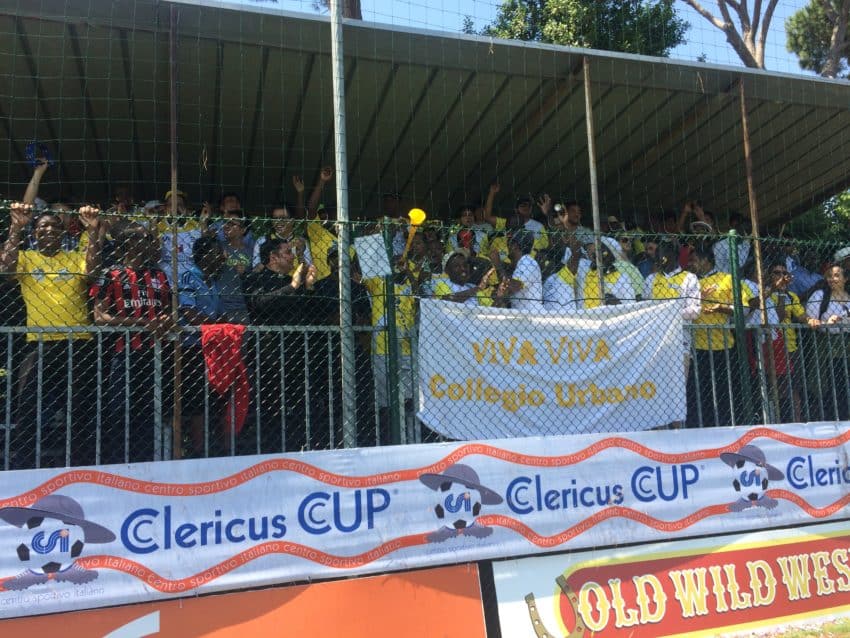
But they play soccer. Many soccer players communicate on the field through conversational profanity. I asked Paver the obvious question.
Do you ever hear swearing?
“We picked a different way to live our vocation but we’re still human beings,” he said. “We still have blood running through our veins. And that blood goes to our heads sometimes.”
I asked what’s the worst he’s ever heard. He paused.
“I’m not sure I can repeat it,” he said, finally. “We try to let each other know when we think we’ve been wronged. Let’s say that.”
I walked through the fence onto the field in front of the two finalists who entered side-by-side in single file, just as Real and Liverpool would do later that night. These two teams were from opposite sides of the world: an American side with THE perfect nickname, the North American Martyrs. Their opponent was the defending champion, Pontificio Collegio Urbano, a group from all over Africa. Pope Francis even greeted and congratulated them at the Vatican earlier in the week.
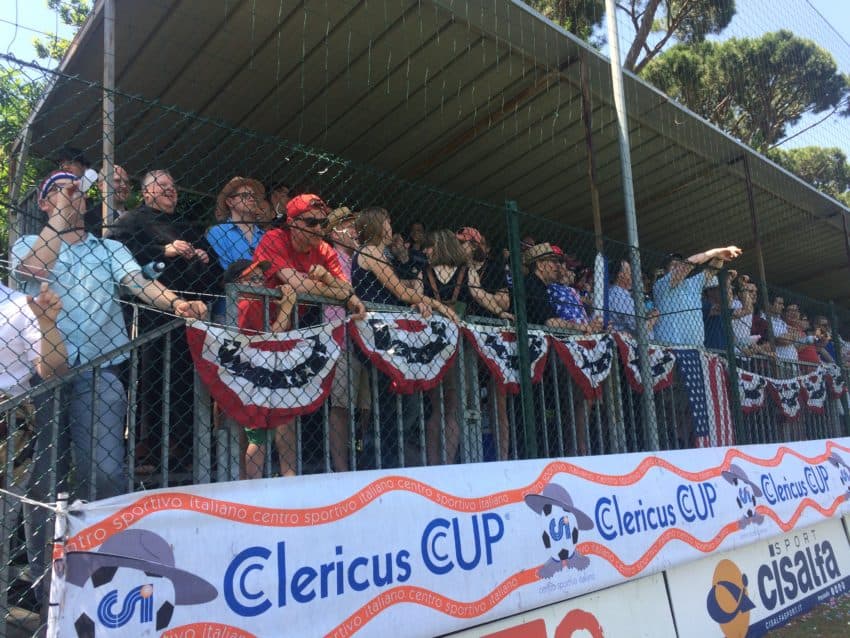
Appropriately, the Martyrs were dressed in red, white and blue and Collegio Urbano wore uniforms of bright yellow and white. They looked like sprinting Vatican flags.
Without their religious gear, they looked like any rec league players, except the African team was almost universally short and the Americans were almost all boyish and almost, well, virginal. But they were all fit. I was curious about the level of play.
“I’m 42 years old and I’m still playing it,” Paver said. “That answers your question.”
If the level isn’t high, the passion is. The small grandstand seating 200 was packed, all with mostly students from the 80 seminaries around Rome. On one side hung red, white and blue bunting, the kind you see draped around baseball stadiums during the World Series. Behind it and the Cyclone fence were Americans yelling “USA! USA! USA!” and singing Queen’s “We Will Rock You.” On the other side, Africans with yellow and white stripes painted on their faces banged drums and sang the entire game, ranging from Shakira’s “This Time for Africa” to the rhythmic chant, “VAI! VAI! VAI! COLLEGIO URBANO! (GO! GO! GO! COLLEGIO URBANO!)”
The soccer wasn’t as bad as I thought. They passed well. They dribbled efficiently. They had a plan. Cieslak made a nice stop on a free kick then a cool one-handed grab of a corner kick. His counterpart, Emmanuel Umanah of Nigeria, had a couple of sliding stops on one-on-one confrontations.
Yeah, guys dribbled the ball out of bounds a couple of times. They kicked the ball over the goalpost more than under it. Cieslak’s goalie throws looked like a third baseman pegging one to first base. None of it bothered the fans who kept up the beat of the drums and the Americans’ chant that couldn’t prevent me from smiling: “LET’S GO MARTYRS!”
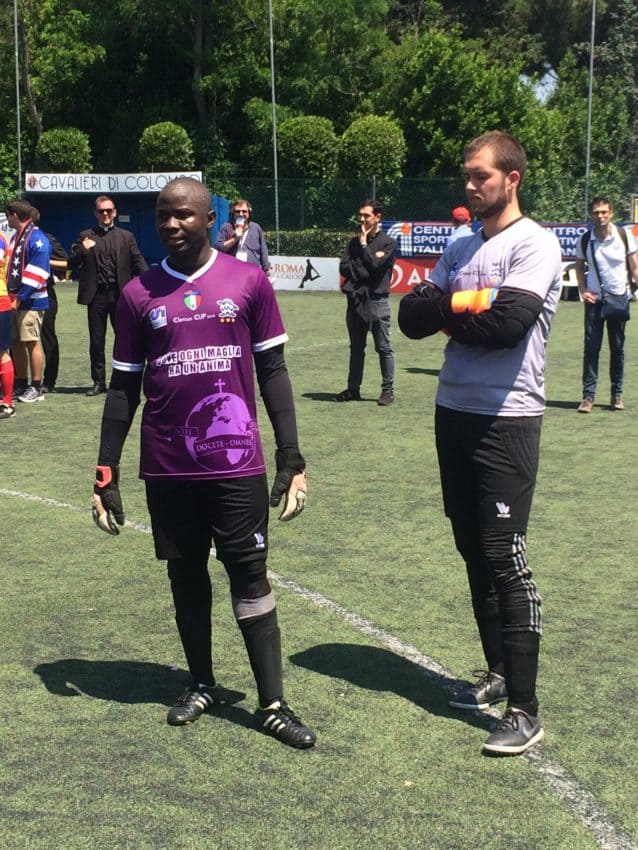
Regulation ended in a 0-0 tie, leading to the penalty shootout, leading to Cieslak staring down Kayiwa. With the Martyrs converting their first penalty kick, Kayiwa took a long run and kicked a medium-speed line drive to the right — just about where Cieslak was waiting. Kayiwa walked back slowly with his head down. Umanah, showing fraternity, gave Cieslak a fist bump. Matthew Goldammer, a hulking redhead who looks a transfer from the Vatican rugby team, banged one off the left goalpost, making it even.
But Collegio Urbano’s Victor Tibanyendera from Tanzania skied one over the goalpost and William Nyce scored easily to clinch the shootout, 4-2, sending him storming into a sea of hysterically happy seminary teammates.
Cieslak, 26, comes from Portland in my home state of Oregon and went to De La Salle North Catholic High School. A goalkeeper since second grade, he showed up as a freshman and quickly became the starter when the regular keeper got angry and punched the ground.
Was it because he swore, he showed anger, he failed to show moral restraint and the school benched him to teach him a lesson?
“No,” Cieslak said, “He fractured his wrist.”
OK, it wasn’t the first dumb question I’ve asked in my career. Soccer is, in a small way, part of the plan for all these future priests. It’s not only to show their human side but it helps them work on the same skills they’ll need in a future parish.
“This is a wonderful opportunity to grow in fraternity,” said Cieslak who soon goes to a parish in tiny Tillamook, Oregon, for a year. “A lot of the things we try to do in seminary formation is to relate to each other on a fraternal level and on a personal level. When you’re out playing with other guys who are working toward the same goal, working to become priests, it’s amazing.”
Being a sportswriter for 40 years, I know athletes pray before games. I asked Cieslak who would God favor in a game if both sides are seminary students and all are praying.
“He favors us all,” he said. “There’s no favoritism with God.”
Then what’s the point of praying? I asked.
“It’s to thank God,” he said. “Thank God for our athletic gifts, gifts of our bodies and we can glorify him and we can glorify him whether we win or lose.”
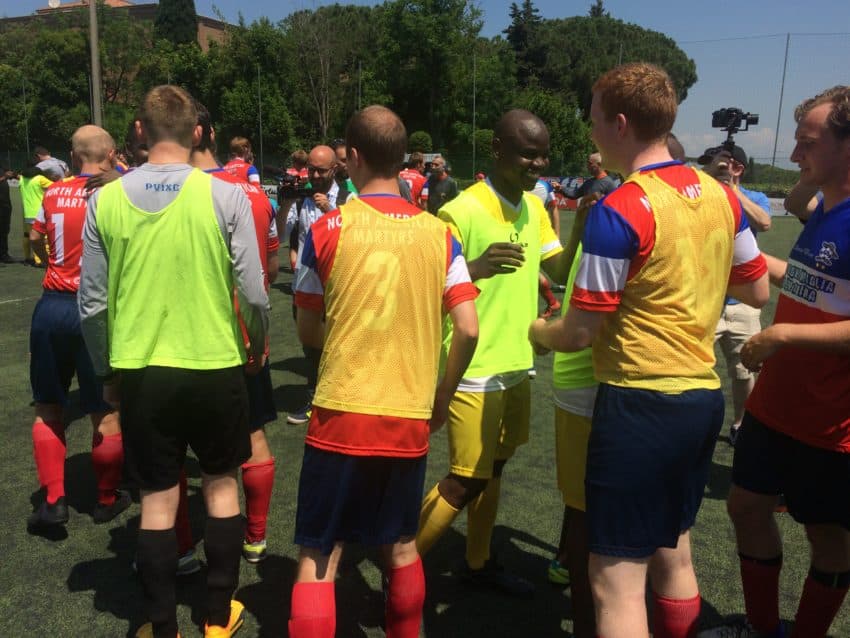
But what does He think when you swear?
“We’re all capable of sin,” he said with a smile.
Soccer and religion transcends the world. Umanah, 28, the Collegio Urbano goalkeeper, started playing when he was a little boy in Nigeria and his friends kept taking him by the hand from midfield to the goalpost.
“They said, ‘Since you’re not good, stay here,’” he said. “‘If the ball comes, you take it.’”
Like the others, Umanah sees a direct connection between soccer and the priesthood.
“The world today, just like Pope Francis tells us, it’s a world that really needs people to go to the different areas to find people,” said Umanah who’s studying canon law. “I think football, apart for the passion I have for it, is also entering society and meeting people like me who are out in the world and trying to dialogue.
“Just like every other social activity (soccer) puts you in contact with people. For example, I never knew some of these footballers. Today, we and the Americans got to know each other. Now we know each other from different realities, from different countries. We get to share our stories and experiences.”
Later that night, I went to my soccer pub and watched Liverpool goalkeeper Loris Karius make two of the biggest errors I ever saw a goalkeeper make. In the Champions League final. In front of the world. He was last seen walking across the field crying, trying to hide his face and tears with his jersey. It was a night that may scar him for life. I’m interested to see what will happen to him, if he’ll ever recover.
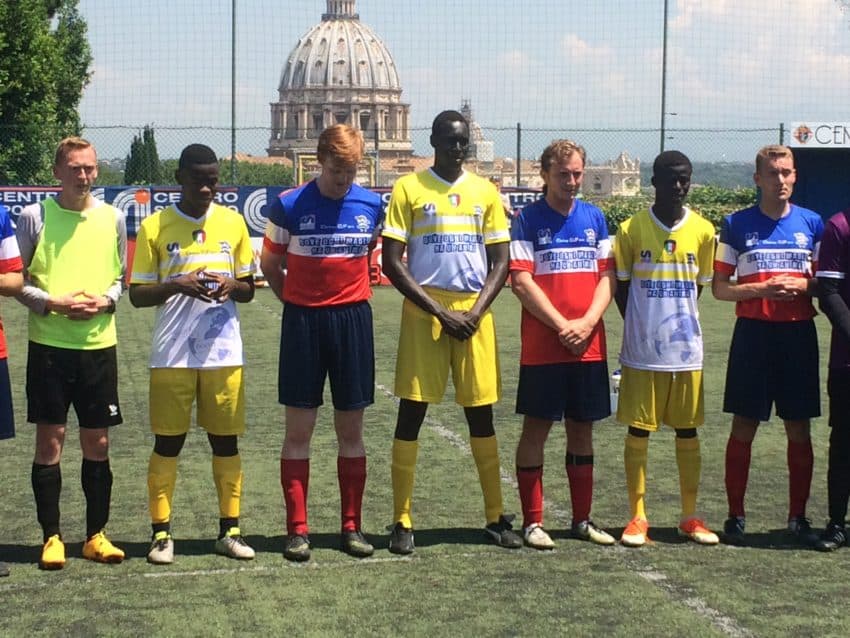
It’s all about perspective. A few thousands miles and even more levels below the action in Kiev, Umanah put the Vatican spin on sport.
“Today was a very nice match,” he said. “We could really see the evangelical spirit. If someone gets down, the other one helps the person. To me, that is the gospel.
“We lost and I’m smiling.”


May 27, 2018 @ 9:12 pm
Nice story, and really nice picture of the basilica in the background. Hey, since Vatican City is a country, shouldn’t UEFA provide membership and the winner gets in the Champions League? Look out, Real!
May 28, 2018 @ 6:12 am
Thanks, Hal. The Italian federation should back the Vatican’s drive to get into UEFA. At least then Italy would have a country it could beat. Maybe.